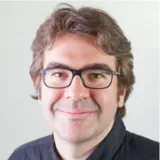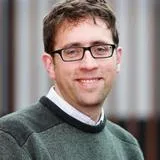I am truly honoured to have received such a prestigious award. The Royal Society Wolfson Fellowship provides both recognition of my team’s work in the past several years, and, most importantly, an extra motivation to further pursue our scientific agenda at King’s with passion and enthusiasm.
Professor Sergi Garcia-Manyes
17 May 2019
Royal Society Wolfson Fellowships awarded to academic staff in Departments of Physics and Mathematics
Two Royal Society Wolfson Fellowships have been awarded to academic staff in the Faculty of Natural & Mathematical Sciences.

Sergi Garcia-Manyes, Professor in Physics and Structural Biology in the Department of Physics and group leader in Structural Biology in the Randall Centre for Cell and Molecular Biophysics, and Christopher Herzog, Professor in Theoretical Physics in the Department of Mathematics, have both been awarded by the £8 million scheme, which helps UK universities to recruit and retain outstanding senior research scientists.
Sergi’s research, ‘Biochemistry under force: identifying novel molecular mechanosensors’, explores how mechanical forces sensed at the surface of a cell can travel inside the cell to trigger biochemical changes in the nucleus. This is where most of the cell fate decisions are made via the activation of specific genes, and mechanical forces determine many cell functions including adhesion, crawling and growth. They also relate to cardiovascular pathologies or cancer.
Sergi’s laboratory will develop new experimental techniques, such as minute tweezers capable of stretching single molecules, able to apply controlled forces to individual proteins and cells – an approach that is not possible using the methods commonly used in molecular and cell biology. The lab’s overarching goal is to investigate how mechanical forces travel across the cytoskeleton to activate gene expression at the cell nucleus, impacting cell behaviour.
On receiving the Fellowship, Sergi said:

Christopher’s work explores the physics of boundaries and defects in quantum field theory and gravity, upon which some of the most important recent developments in theoretical physics have depended. Boundaries are ubiquitous in the world around us and yet are poorly understood in the context of these two conceptual frameworks that describe the universe in which we live.
Black holes, for instance, remain mysterious objects largely because of the event horizon, a boundary beyond which should something fall, it cannot escape. All experimental systems will be finite in extent, with physical boundaries and possibly also internal defects. In general, however, it is not understood how these boundaries and defects change the behaviour of a conformal field theory. Might many of our recent developments in theoretical physics have been obvious had we simply understood boundaries and defects in quantum field theory and gravity better to begin with?
On his Fellowship success, Christopher said:
I am enormously grateful for the scientific opportunities afforded to me both by the Royal Society and by King’s College London. It is a difficult step to leave the country of one's birth and upbringing in search of brighter prospects elsewhere. Receiving the Wolfson has given me confidence that I have made the right decision.
Professor Christopher Herzog


